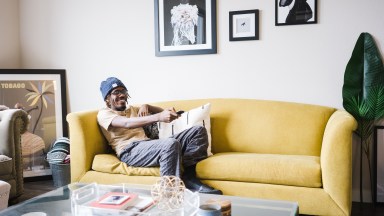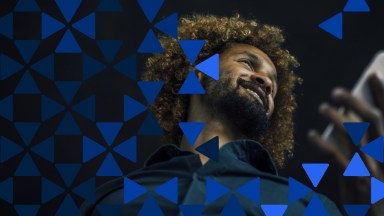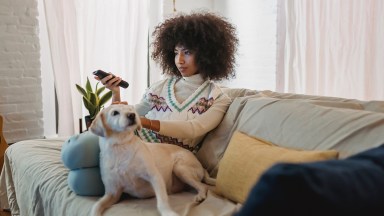African-American consumers continue to be some of the most influential in the U.S. when it comes to everything social and digital. Black women, in particular, have a unique sway over U.S. popular culture. And that sway has a name: #BlackGirlMagic. It encompasses the unique power Black women hold where culture, commerce and consciousness intersect.
Nielsen’s seventh installment in the Diverse Intelligence Series on Black consumers, African-American Women: Our Science, Her Magic, uses our insights to quantify #BlackGirlMagic. This information is important for marketers to understand, as Black women make up 52% of the Black population and control the lion’s share of African-Americans’ $1.2 trillion in annual buying power. In fact, the increase in total Black buying power can be traced in part to the increase in educational attainment and entrepreneurship of Black women. Black women will only continue to grow in importance as the overall population continues to become more diverse. So, where can companies go to reach these powerful consumers? Any conversation about reaching Black women starts on digital and social platforms.
SOCIAL TASTEMAKERS
Black women are the leaders, originators and trendsetters in the bitingly witty and culturally influential community known as Black Twitter. In fact, #BlackGirlMagic was a movement emanating from this very group, beginning as a way to share achievements and examples of the beauty and power of Black women. Because of their relative youth, with an average age of just 35.1, Black women see their online presence as an extension of themselves and use these platforms in a way that reflects that.
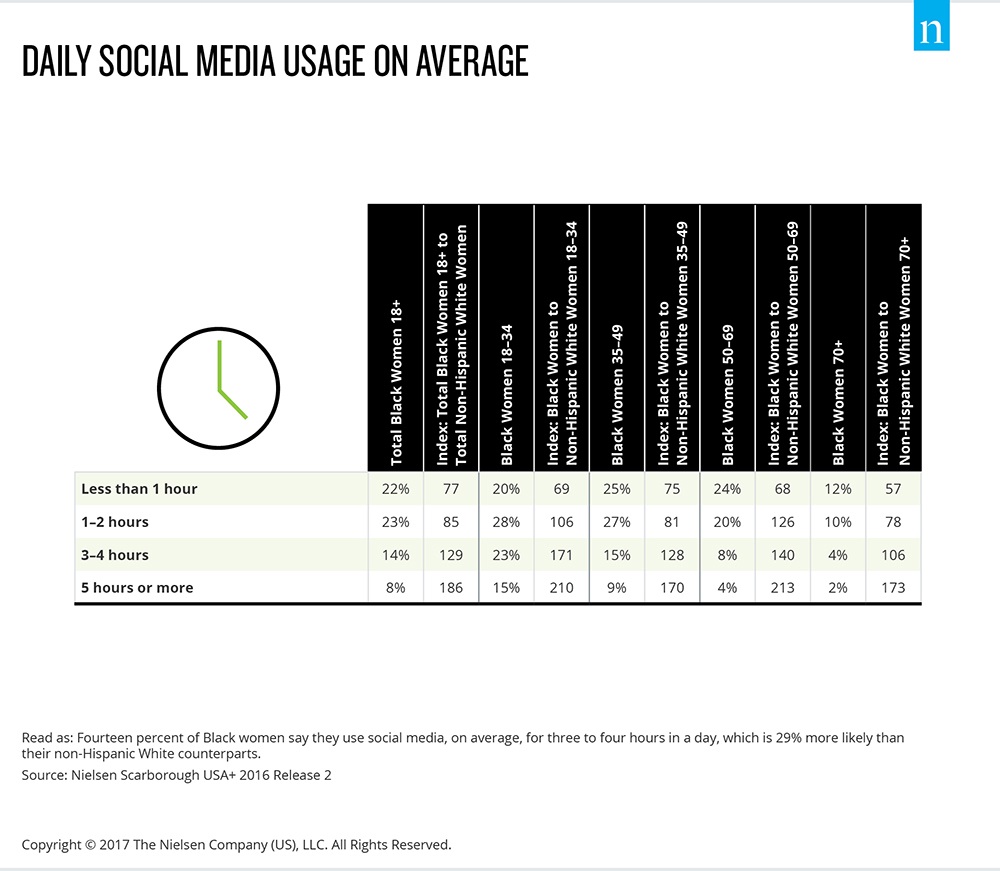
Black women aged 18 and older are 29% more likely to spend three to four hours on social media per day and are 86% more likely to spend five or more hours on social media per day than non-Hispanic White women. When they are on these sites, Black women are more likely to say they use them to meet new friends (21%), meet or network with professional contacts (17%) and to find people with similar interests (14%) than non-Hispanic White women. However, perhaps more importantly for brands and marketers, Black women are more likely to say they use social media to show support for their favorite companies or brands (25%) and to find out about products or services (12%) than non-Hispanic White women. Companies that are able to make meaningful connections with Black women will reap the benefits of having socially savvy brand advocates dictating the conversation about their products.
TELEVISION IS KING
While Black women are leaders in social media, marketers cannot overlook their consumption in traditional media platforms, like television. Black women aged 18 and older watch 51 hours and 36 minutes of TV per week, compared with 36 hours and 38 minutes for non-Hispanic White women. This high level of viewership has been a boon to diverse content on broadcast, cable and premium cable networks.
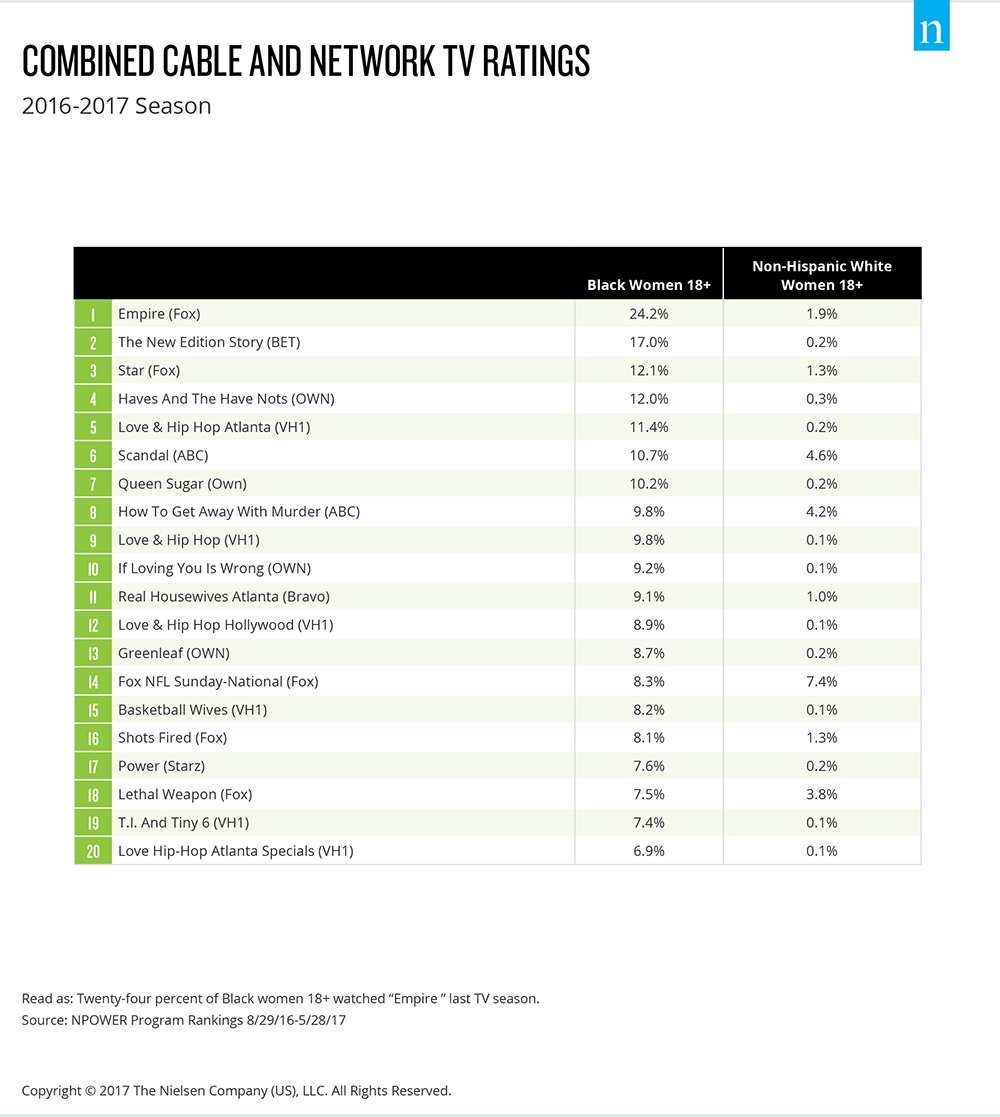
Each of the top 20 most watched shows among Black women features either a Black lead character or a predominantly Black cast, indicating that these consumers gravitate toward Black celebrities and multidimensional characters of color. The top show among Black women 18 and older is “Empire,” with an average of 24% of Black women watch. The show features both a predominantly Black cast and African-American actors with award-winning star power in lead roles.
“Empire” is also an example of the power of Black women’s social savvy on the success of these television programs. When “Empire” airs, it inevitably trends on a variety of social platforms, illustrating the power of this “magic.” The social buzz can drive viewers to tune in while the show airs and encourage fans to watch the show live in order to participate in the real-time social conversation. According to Nielsen Social, “Empire” was the second-highest rated show of the 2016-2017 television season and generated an average of 860,000 interactions across Twitter and Facebook every new episode. Clearly, Black women are important drivers of content on television, and designing programs that appeal to this audience can reap viewership benefits through organic social engagement.
PURCHASING INFLUENCERS
#BlackGirlMagic extends into consumer goods purchasing, as well. Black women enjoy sharing their opinions and preferences on products and look to their peers when looking to make a purchase decision. This cultural exchange is integral to the concept of Black Girl Magic. Half of Black women say they often seek advice before making a purchase, which is 11% higher than non-Hispanic White women. Conversely, 43% of Black women say they like to share their opinions on products by sharing reviews and ratings online. Brands that are able to design products that appeal to Black women can benefit from this group’s willingness to make recommendations when they find a product they like.
Additional highlights from the report include:
- The number of businesses owned by Black women increased by 67% between 2007 and 2012, compared with a growth rate of 27% for all businesses owned by women.
- Black women spend 106% more on ethnic hair and beauty aids than non-Hispanic White women.
- Black women are 34% more likely than non-Hispanic White women to say they regularly attend religious services.
- African-American women are 12% more likely than non-Hispanic White women to shop at jewelry stores, whether for costume or fine jewelry.
For more insights, download Nielsen’s African-American Women: Our Science, Her Magic report.
